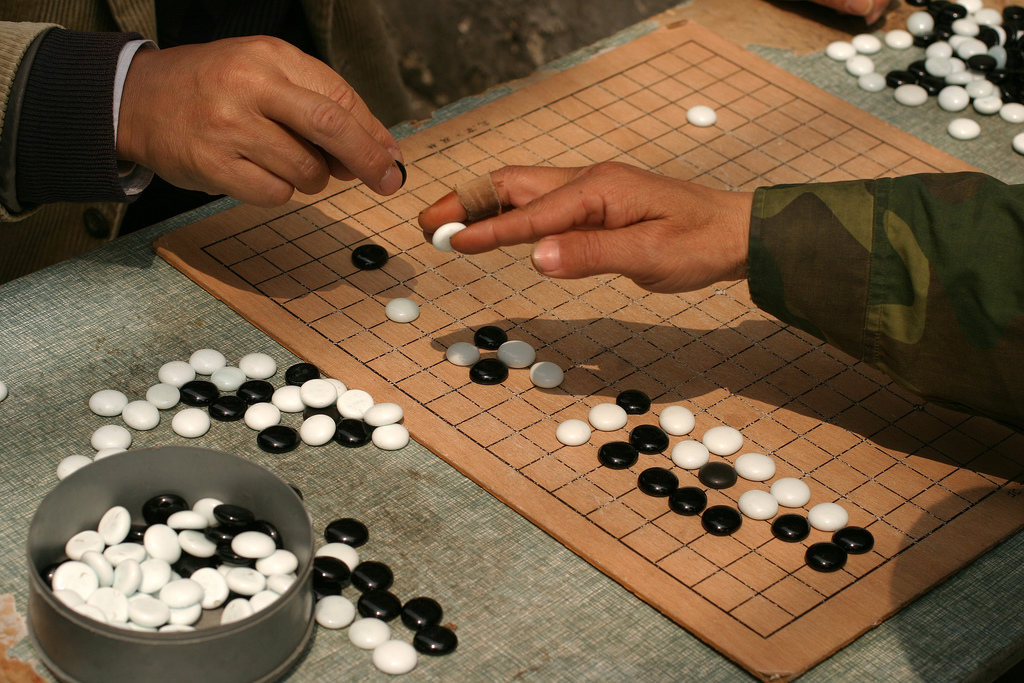On March 12, AlphaGo—a computer program developed by Google’s DeepMind project—won the third out of five matches in the game of Go against Lee Sedol. With two more matches remaining, it became clear that Sedol, the South Korean who is regarded as the best Go player in the world, was no match for AlphaGo. For many, this was a reminder of IBM’s Deep Blue win over world chess champion Garry Kasparov back in 1997.
Go is a strategy game that originated in ancient China more than 2,500 years ago, and is still very popular in East Asia. Two players take turns placing black and white stones on a 19×19 grid, with the objective being to surround a larger total area of the board than one’s opponent.
This seemingly simple objective, however, belies Go’s immense complexity. There are 361 unique ways a player may begin a game of Go. In comparison, there are only 20 possible ways to begin a chess game. For further contrast, it is estimated that there are 10700 possible ways a game of Go can be played. Compare that with the 1060 possible scenarios in chess and you will understand why Go is considered one of the most complex games around. That is the reason why many experts did not anticipate a computer program beating a top-ranked Go player for at least another decade.
The work of the London-based artificial intelligence team behind AlphaGo is exceptional to say the least, and the win nothing if not historic. In effect, it adds one more item to the long list of things that machines can now do better than humans. And as the list grows longer with each passing year, the calls of a concerned group of people grow louder.
In a widely publicized open letter that was signed by the likes of Elon Musk, Stephen Hawking, the founders of DeepMind, and many more heads of AI research in various institutions and technology companies, concerns over “potential pitfalls” of artificially intelligent systems were raised. The letter stressed the need to ensure the robustness of AI systems and that they “do what we want them to do.” While the letter’s call for more research into the societal impacts of AI is understandable, one might question the appropriateness of its alarmist tone.
Artificial intelligence is a relatively new field with major breakthroughs being achieved at a relatively continuous pace. A great portion of advancements in subcategories such as computer vision, vehicle automation, search, and machine learning have been made within the past two decades. Thus, if the high tech industry were to adopt the overly cautious attitude recommended, we would be capping the technological windfall from this promising field.
Perhaps unsurprisingly, South Korea announced an $860 million investment in AI research shortly after the 5-game Sedol-AlphaGo match, which had captured the whole country’s attention for a better part of a week. “Above all, Korean society is ironically lucky, that thanks to the ‘AlphaGo shock,’ we have learned the importance of AI before it is too late,”announced president Park Geun-hye.
We need to stop fantasizing over a Hollywood-esque robot takeover, and invest more in research to advance the frontiers of AI . It is too early to be putting brakes on AI research because of hypothetical “pitfalls,” not least because no system exists that is better than humans in more than one specific task. So far, we have separate programs that can play Jeopardy!, chess, Go, checkers etc.; recognize and carry out simple speech commands; identify and catalogue objects in images; and drive vehicles—but none that can do, or learn to do, any of those tasks in combination.
AlphaGo’s win highlights the speed and magnitude with which advancements are being made in the field. While the US has a leg up in AI research and products, most of it is carried out by R&D departments of major technology companies. In order to secure the country’s lead in what could be the next big thing after the internet, the government should make concerted efforts to encourage independent academic research.






